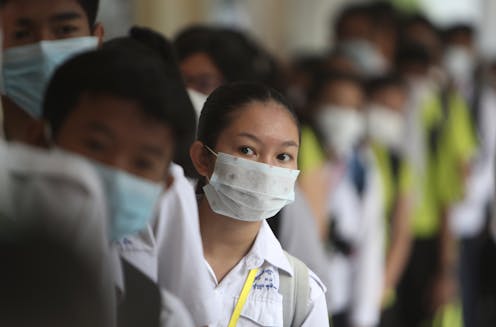How do I know if I might have coronavirus? 5 questions answered
- Written by Catharine Paules, Associate Professor of Medicine, Infectious Diseases, Pennsylvania State University

Editor’s note: The new coronavirus, 2019 n-CoV, continues to spread in China, and cases are being diagnosed in many other countries, including the U.S. In some of those countries[1], including Germany and Vietnam, people who have not visited China have been diagnosed[2]. With initial symptoms that resemble other diseases, many people are wondering how to know whether to seek medical help.
With the new coronavirus now in the US, am I at risk?
The biggest risk factors for being infected with the new coronavirus are travel to China, particularly Wuhan and other areas of Hubei Province, and close contact with a person who has a suspected or confirmed n-CoV case. Without those risk factors, the chance for the general American public of catching this virus is low.
However, the outbreak is rapidly changing, and it is unclear how the situation in the U.S. will evolve in upcoming weeks.
What are the symptoms of 2019 n-CoV?
Most cases of 2019 n-CoV have had fever and signs of pneumonia, like cough or shortness of breath. In some cases people are not able to breathe on their own and require the use of a ventilator. A small percentage of people die.
What should I do if I have any of these symptoms?
If you experience any of these symptoms within 14 days of travel to China, or within 14 days of coming in close contact[3] with an individual infected with the coronavirus, you should immediately call your health care provider. It is best to call ahead before going to a clinic or emergency room.
Your health care provider will evaluate you with the help of your state’s public health department and the federal Centers for Disease Control and Prevention[4]. If your travel history and reported symptoms fit with n-CoV infection, you may be tested for the virus. Right now that test can be performed only at the CDC, so your health care provider would send samples to the CDC for testing.
What else could it be?
At this time of year many respiratory viruses are circulating in the community, including influenza, RSV[5], rhinovirus and human coronaviruses, which are different from the 2019 n-CoV virus. It is much more likely that you have one of these viruses than the 2019 n-CoV virus, even if you have traveled to China.
So there are other coronaviruses?
Yes. There are four human coronaviruses that circulate each year in the U.S. They cause 10% to 30% of upper respiratory tract illnesses[6] in the U.S., with mild symptoms akin to the common cold. Health care labs can test for these coronaviruses – but not for 2019 n-CoV.
References
- ^ some of those countries (www.cdc.gov)
- ^ people who have not visited China have been diagnosed (www.nytimes.com)
- ^ close contact (www.cdc.gov)
- ^ Centers for Disease Control and Prevention (www.cdc.gov)
- ^ RSV (www.cdc.gov)
- ^ 10% to 30% of upper respiratory tract illnesses (doi.org)
Authors: Catharine Paules, Associate Professor of Medicine, Infectious Diseases, Pennsylvania State University
Read more https://theconversation.com/how-do-i-know-if-i-might-have-coronavirus-5-questions-answered-130786

